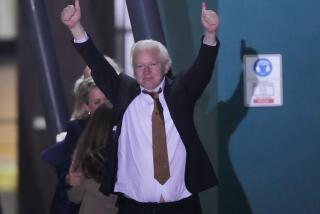Sex and WikiLeaks
- Share via
According to a classified and unusually salacious Swedish police report obtained by the Guardian newspaper, WikiLeaks mastermind Julian Assange went to dinner in August with a woman identified only as “Ms. A.” When they returned to her Stockholm apartment, he began stroking her leg. Then, although she says she thought things were moving too quickly and uncomfortably, he was pulling off her clothes and snapping her jewelry. According to her complaint, he pinned her arms and legs to stop her from reaching for a condom. He finally agreed to wear one, but continued even after the condom broke, or after he had “done something” that broke it, as Ms. A put it.
FOR THE RECORD:
Assange: A Dec. 22 editorial referred to sexual misconduct “charges” against WikiLeaks founder Julian Assange. In fact, he is wanted for questioning in Sweden in connection with allegations of sexual misconduct. No formal charges have been filed. —
That alleged encounter and an oddly similar one with a “Ms. W” (who alleges that he had unprotected sex with her while she was asleep and later “ordered her to get some water and orange juice” for him) led to a variety of charges of sexual misconduct against Assange, including rape.
These titillating and not-very-nice allegations involving the man who has distributed tens of thousands of secret State Department cables and documents to the news media are being discussed by people across the country and around the world, just as they once discussed the tiniest particulars of President Clinton’s Oval Office trysts with Monica Lewinsky. And as they discuss the details, they’re also raising serious questions about how sexual misconduct should be dealt with: Should a man be charged with rape for having sex without a condom? For having sex with a woman when she’s asleep? In recent decades, Sweden’s laws have grown increasingly protective of women’s rights; are they too tough, or do they strike the right balance? Does it make sense that Sweden has three degrees of rape, including “less severe,” which Assange is charged with and which is generally used when a person uses threats or mild force to have non-consensual sex?
These questions are intriguing but are ultimately beside the point when it comes to Assange’s role in WikiLeaks . For Americans chiefly concerned with the publication of classified documents, his alleged sexual escapades in Stockholm are neither here nor there; the only germane question about the allegations is whether the legal process is taking its proper course, or whether there’s been some nefarious American pressure brought to bear. Assange’s supporters have insisted that that the rape charges, which at one point had been downgraded to “molestation,” have been reinstated by the Swedish authorities as part of a U.S.-inspired campaign to punish Assange and WikiLeaks for releasing classified information, and perhaps to put him behind bars until American prosecutors can file charges against him.
We’ve seen absolutely no evidence of this. It’s apparently not uncommon in Sweden for such charges to be downgraded and then reinstated. If in fact the United States was applying pressure — for Assange’s arrest or for restoring the charges or for his extradition from Britain to Sweden — that would be highly inappropriate. If Assange’s defenders unearth any proof of that, they should by all means make it public. Until then, we hope the case will proceed fairly and in accordance with Swedish law.
More to Read
Sign up for Essential California
The most important California stories and recommendations in your inbox every morning.
You may occasionally receive promotional content from the Los Angeles Times.










